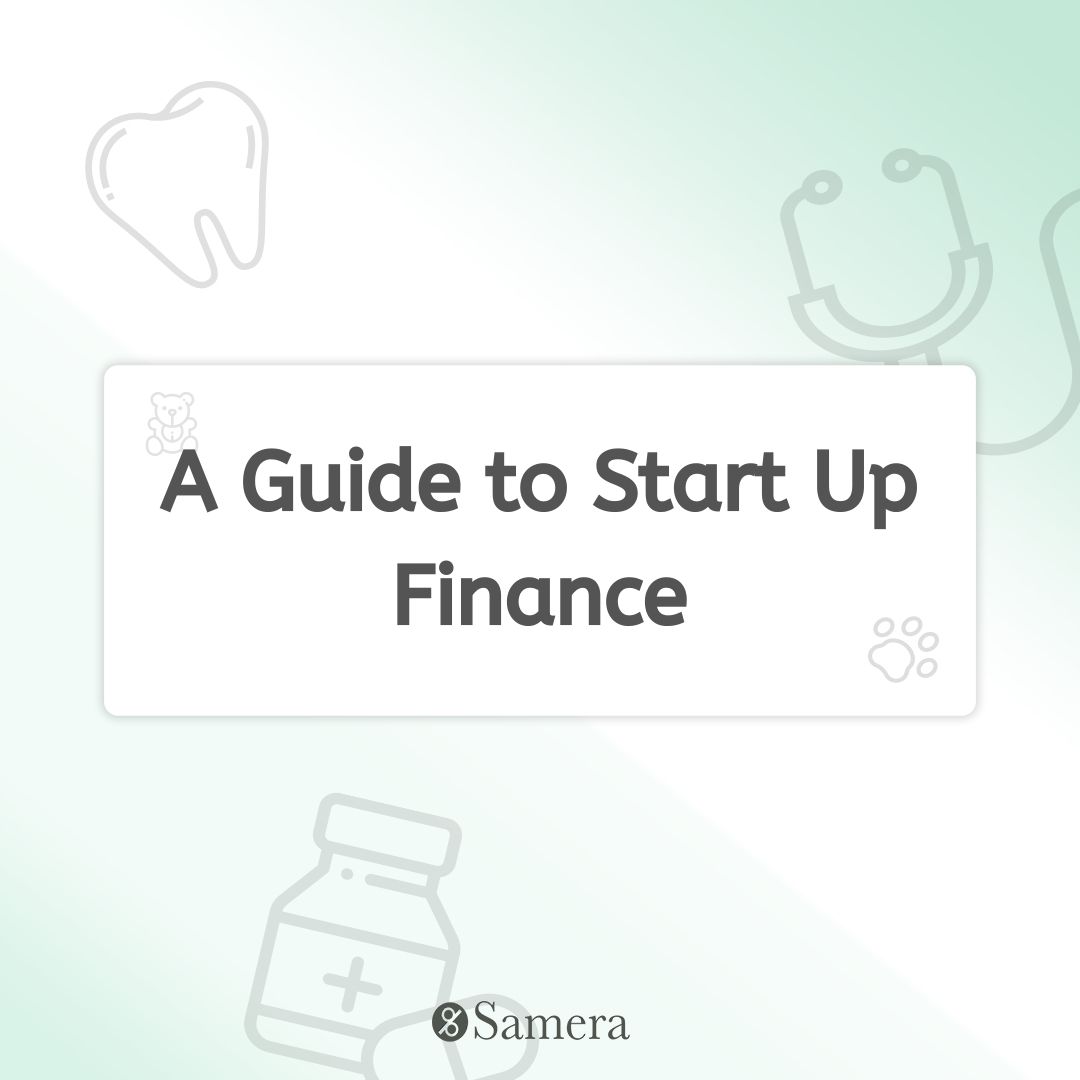Your knowledge of the dental industry itself as well as the knowledge, skills, and the energy you put into your dental practice, are all vital components to enable your business to be successful. However, the success of your dental start up is also dependent on your funding.
Having the right start up finance is crucial if you plan for your start up business to succeed.
Startup loans from Banks
For many dentists starting out on their own with their own practice, especially ones that have equity that can be borrowed against (e.g. a house), a bank loan might seem like the most logical option for you.
If a business opportunity presents itself to you as a dental associate, but the only thing you need is a substantial cash injection in order to take it up, then there are many banks offering various options of unsecured and secured start up loans. It is worth remembering that banks are strict about lending to start ups so be sure to be fully prepared when applying for one.
Don’t be afraid to shop around (or use a commercial finance broker). You may have been with the same bank for years, but that does not mean that they will be available to provide the best deal for your business loan. Look at what every bank has to offer you, they all offer different perks and terms while taking out loans and some may be better than others, which is why it is best to shop around and find what is best for you.
Banks such as Barclays are ready to explore different loan alternatives that are right for you if your business plans prove to be viable. If you are approved for a loan up to £100,000, you will usually have the money within 48 hours of signing the paperwork, giving you the means necessary to take your business to the next level.
These types of startup loans are helpful if you need a quick and straightforward way to finance your business. Most banks give you a fixed rate for the life of the loan so there is no need to worry about any sudden changes in interest rates. Repayments are spread over the course of 1 to 10 years.
Click here to read our article on 5 Reasons to Use a Commercial Finance Broker
Government-backed startup loans
There are many government grants and loans available to small businesses and dental start ups, helping save money, lower start up costs and helping small enterprises grow. Government backed start up loans are not the same as grants. It is important to note that with government loans, you will have to pay all the money back, often including interest.
These loans differ from small business bank loans as they are personal loans for business purposes. They are also unsecured loans which means you do not have to put up any assets or estate as security to receive the money.
Borrowers can access between £500 and £25,00, payable over one to five years at a fixed 6% interest per annum.
Government supported start up loans are available for entrepreneurs looking to start a business. The scheme itself is designed for individuals over the age of 18 who have a viable business plan, but no access to capital to fund their ideas.
A start up loan is a type of finance that is specially designed to help new businesses that have been trading for less than 24 months. A start up loan is in its basic form a type of personal loan except it is solely for business purposes and is also backed by the government. The loan is available to individuals looking to grow a business in the UK. The scheme can provide loans to businesses in every sector.
When you apply you are usually paired with a dedicated and skilled business advisor who will support you throughout your application. If your application is successful, the loan comes with the option of 12 months free mentoring.
How much does it cost to start up a business in the UK?
Unfortunately, there is no whole figure that we can give you to determine how much money you will need to finance your start up business in the UK. Costs can vary greatly depending on the location and industry you want to get into, amongst many other factors; all of which you need to consider before you begin.
Once you have the answer to the location and industry and you have a viable business plan, it is important to figure out whether you have access to the start up finance that you will need to not only get your business started but also keep it running.
The Office for National Statistics (ONS) disclosed that less than half of the UK businesses that started up in 2011 were still going five years later. The two main reasons for the high rate of business failure is due to unexpected costs and poor budgeting. So here are a few of the most important costs you will face and have to be prepared for when raising start up finance.
More often than not these are costs that some people may class as ‘hidden costs’. These are some of the costs many dental practice owners forget to factor in when first starting up their practice henceforth giving them financial trouble further down the line.
Business and Legal advice
Many new business owners do not realise that they need to factor in professional business and legal advice to their start up finance before beginning their new venture, especially when the start up is in the healthcare industry.
It is worth researching what kind of fees you will need to pay for these services and also consider how much money you will need to set aside on legal advice and accounting services. All of which services are vital to many businesses, including any start ups.

There are many solicitors and accountants that will give you a free consultation, this allows you to pre-plan and budget for the fees that you will need to pay them in the future. If you expect your finances to be particularly complex, it may be a good idea to pay an accountant a retainer fee so you can consult them whenever you need advice.
Contact us to find out more
Business Premises
Unless you are planning to run your dental practice from your home, you will need to find yourself business premises. There are usually very few new businesses and start ups that will already own their own premises. It is more common to lease or rent from a commercial landlord. Therefore, you will often need to consider commercial property costs when applying for start up finance.

Commercial leases often operate on a quarterly rather than monthly basis, especially those for retail premises. This payment method means that instead of facing a smaller bill every month, you are faced with a hefty bill every three months. This can end up being quite a big expense for many new businesses and is one of the main reasons retail businesses run into financial difficulties therefore, it is imperative that you plan for these expenses beforehand.
Read more about commercial property financing here.
Company incorporation
You might want to set up a limited company, depending on your circumstances. Doing this directly through Companies House is relatively quite cheap. However, most people choose to use an intermediary firm to complete the paperwork.
The process in itself can start at less than £10 for basic online services but usually can run up to hundreds of pounds, especially if you choose to use a registered office.
It is also important to note that The Companies Act requires company directors to provide their ‘usual residential address’ to Companies House. It is important to note that if you do choose to provide your home address, this will be on public record. Another option would be that you could choose to use an address hosting service with a solicitor or formation agent however, this will often incur another fee.
If your business is in need of an office space rather than retail premises a good option for you may be serviced office leases. These leases offer you shorter agreements, ability to pay monthly, as well as a lot more freedom and scalability. Serviced leases do include business rates, which can be an added financial burden over a regular lease.
It may now seem that working from home will be the cheapest option for you but even while working from home, there will be setup costs. These will include computer equipment, office furniture and the addition to your monthly utility bills as you will be at home most of the day.
Marketing
Marketing is one thing that many new businesses overlook as an expense when raising start up finance. To make sure that your new venture receives the attention and cash flow it needs to get off on the right foot and succeed. You need to make sure that people know about your business and what it offers.
Old fashion techniques such as word of mouth won’t help you drive sales in the way you need them to take your business off the ground in the first couple months of your business. You need to ensure whatever marketing option you decide, it gets the message out there and makes people know about your business and what it offers.
There are various types of marketing available to you and the costs of each varies considerably. Online marketing such as PPC is one of the most effective types of marketing in this day and age and many online marketing techniques are fortunately quite cheap while many offline marketing methods such as billboards and direct mail involve big initial outlays.

However, there are also quite expensive online marketing techniques to also keep in mind such as social media ads and influencer sponsorships that are proven to be very effective marketing techniques.
An example of a cheap effective way to market is to optimize your website to make sure that you are well placed in search engine results. This is a very low cost but highly effective way to generate business.
There are so many businesses that do not allocate enough budget towards marketing and that is usually the fund that gets cut when when start ups are strapped for cash. You may think that dentistry is an service that is always need needed and will therefore always provide revenue, unfortunately with so much dental competition out there, marketing your dental practice and dental services is mandatory for your dental practice to succeed, sometimes this means hiring marketing experts to help.
It is important to note that you may be right with thinking that your money will be better spent with tangible aspects of your business that seem more important such as buying stock, leasing an office or buying equipment. But, your business venture will struggle to attract customers and make money unless you make them aware of your business to begin with. This is why you should think very carefully before you cut your marketing spend.
Remember, you need to spend money to make money!
Equipment, stock & tools
If the business you are trying to start up is a retail business, stock is most likely to be one of your biggest expenses. However, if your business is a dental practice, you will need to set aside funds for equipment that you will need. Most suppliers will offer you 30 days credit, some will even offer more depending on the circumstances. You can take this credit period and use it to your advantage to help ease any cash flow problems during your first month of business. You may also want to put off buying stock until the last possible moment to ensure you make the most of your credit period.
The amount you spend will depend on the nature of your business. Regardless of whether your business is in the retail sector, or the healthcare dental industry, it is important that you shop around first to ensure that you get the best deal from suppliers.
Again, regardless of the sector that you are operating in, tools and equipment is necessary for all businesses, even if it is just a computer and some desks, and they can be a big upfront expense that you will need to consider and budget for in your start up finances.
Read more about Asset Finance here.
Business travel
Often, travelling comes with starting your own business, dentistry doesn’t necessarily require many flights and long road tips but while you are travelling for meetings to seeing clients, it is important to factor travel costs into your business expenses, remember, you are able to claim back any deductible costs in your tax bill.

Business travel includes the costs of public transport, or maybe even buying a commercial car or van. If you are buying a new vehicle for business purposes, remember that you need to include all these associated costs in your cash flow plan. Buying a new vehicle is a big financial spend that is accompanied with other expenses such as fuel, road tax, insurance, breakdown cover and loan repayments; to name only a few.
Business Insurance
For most businesses, you will need insurance from the first day you begin operating. Without it, you may risk hefty financial expenses if you are ever in the unfortunate position that something goes wrong. Business insurance isn’t always very expensive, but it is important to get the right type of insurance to cover your business just in case.
The main types of insurance to consider are public liability insurance, emperors liability insurance, and professional indemnity insurance. There are also other insurance options available to you that can protect your assets such as tools and equipment as well as your premises.
What is a business plan?
In the simplest form, a business plan is essentially a map of your business that outlines the journey of your business venture, your goals and specific details on how you plan to achieve all the goals you have set. Do not get caught up with the idea that a business plan has to be a long, formal document as if it is some type of essay that will get graded.
Maybe that was the way it was once upon a time but, that just isn’t the case anymore. You don’t need the business plan to be excessively long with big words that make you sound fancy and smart. Your plan needs to be succinct, to the point and you need to make sure that whoever is reading it understands that you have thought of every possible expense, and every single small subset that will potentially be part of your business.
At its heart, a business plan is just a plan of working out how your business will actually work and become profitable. It will also include clear steps of how you’re going to make it succeed.

To be clear, in your business plan, especially for start ups, you need to define your business goals. From the beginning, establish clear objectives with actual, realistic, measurable results. Link high-level goals and initiatives that are realistic and achievable to upcoming work, show how the work you will do will deliver value. The sole purpose of your business plan is to help break any uncertainty in the reader’s mind about your potential business. Including aspects such as sales projections, expense budgets and carefully thought through milestones.
It will help to include how you have articulated the foundational elements of your business strategy. Visualise where your company is headed and base it solely on real numbers and statistics. As mentioned earlier, you need to set budgets and add financial data to your plans. Estimate revenue, costs and projected business value. These figures will allow you to make better, more informed expense decisions and report investments in a meaningful and accurate way.
It will become pretty obvious to certain people that you don’t know how much money you need and when you need it if you haven’t categorically laid our projected sales, costs, timing of payments and expenses on your business plan. Whether you need to convince friends and family to invest in your new venture or investors and banks, these numbers need to be included to ensure that you are someone who is worth investing in.
For start up companies, the business plan should be focused on explaining what the new company is, what it is going to do and how it is going to accomplish the goals you have set out. The most important aspect that your business plan needs to include is why and how you are the right person to achieve your goals.
Contact us to find out more
Related Articles & Webinars
Starting a business with poor credit history
Accessing capital is necessary for business ideas that are looking to grow and become profitable. Usually, start-up loans or line of credit is the most usual, traditional and obvious place to find the funding that you need but many new businesses find themselves knocked back from funding applications because of their poor credit history. The first step you need to take is to know whether you have a poor credit history or bad business credit.
Firstly, it is important to understand that having bad credit is not the same as having no credit at all. If you have no credit history, lending becomes lightly simpler for you. You just need to demonstrate that you have a viable business plan for your dental practice that is worth investing in. A poor credit rating can affect your ability to get a start up loan from mainstream lenders, such as banks. Luckily, here are various alternative ways to secure a business loan as well as repair your bad credit history so finding funding in the future is easier for you to obtain.
A start up loan usually means that you have no previous trading history.
Can I qualify for a small business loan with bad credit?
YES!
While poor credit will hinder your chances of securing start up finance with many traditional lenders, it does not end your quest for funding. Having bad credit history means that you need to change who you go to get your financial capital from, it doesn’t put you out of the game for good. There are still plenty of start up finance options available to you now more than ever, even if you have a bad credit history. You need to be mindful that while some lenders will still lend you money, due to your credit history extra security may be needed to put in place as collateral as well as higher interest rates.
Who lends to start up businesses?
There are many different kinds of lenders who will help fund start up dental practice; both traditional and more contemporary lenders are now available to suit your individual needs best. It’s a great time to be a start up right now because, thanks to online lending companies and a pledge from the UK government to support small businesses, there are so many options available to you beyond traditional high street banks for start up finance.
Where can I get start up funding?
There are a few different options available to you other than tradition banks to help fund your startup. Here are a few:
Banks
A bank loan is capital that you borrow from a bank over a fixed amount of time. Applying for start up finance through a bank is still the most traditional way to obtain a loan to help start up your business. These loans can be secured or unsecured, depending on your circumstances and business plan, both options may be available to you.
Bank loans protect your cash flow from the impact of large purchases and help your business get off the ground with fixed monthly repayments. Banks are no longer like robots with cue cards reading off a script to decide whether you are worthy of a loan or not. Most banks look at your business plan, your previous relationship with them (E.g debit/credit accounts) as well as you as an individual and give you a personalised quote from that. In most cases you can find out whether you are likely to even get approved before you apply.
Remember, an amazing business plan is not just pivotal for you to create a clear vision for your practice but is instrumental if you are to win funding from the bank. Ensure you provide as much information as possible about how the money will be used.
A huge benefit from borrowing from banks is that you retain full equity in your company and the bank does not have a say in how it is run. Most banks also offer complete applications that can be carried out online and if you are approved, you can receive the funds immediately during working hours.
Government scheme
The government start-up loans scheme has already lent for £100 million in funding start ups. This scheme not only gives money to these businesses, it also understands that being an entrepreneur may mean that you lack some necessary business experience to help your company become profitable which is why the scheme pairs applicants with a Delivery Partner.
This individual who you are paired with is accompanied with the skills necessary to help the start up business become approved and as successful as possible. This individual will help in creating a business plan and will continue supporting the business even after the application process. Those of whom are granted the loan will be paired with another individual who will become their mentor to guide them as they start their business. As this is a loan, not a grant, the loans must be paid back within five years, often with interest.
Crowdfunding
Crowdfunding is becoming an increasing popular way to raise capital for start up funds. If you are unfamiliar with crowdfunding, simply it is a way for businesses to get small amount of funding from a lot of people to raise the funds they need rather than traditionally borrowing a large sum from one or two lenders.
By listing on crowdfunding websites such as kickstarter or indiego.com, your proposal can be seen by masses from hundreds to thousands each of whom can pledge as much or at little money to your business as they want. Essentially it’s similar to donating however, crowdfunding is not a catch-free capital.
Equity based crowdfunding means that in return for someone’s investment you trade equity in your business and there is also reward based crowdfunding where you have to offer something to your investors in return for their investment, this could be anything from free tickets to your launch event or sending them your product for free to try.
Loans from not-for-profit lenders
There are organisations that provide an alternate source of funding. Dental businesses can apply for up to £25,000 in funding and similar to the government start up loan scheme, individuals will be paired with an experienced mentor/ business advisor who can help them with their application as well as any further guidance needed.
Peer to peer lending
Peer-to-peer lending is another fairly new way to obtain the funds you need for a startup. It is similar to crowdfunding where there are a number of investors on an online platform that you can reach. The majority of these peer-to-peer lenders have online loan applications and also have loan calculators so you can set the loan amount and term that suits you best and you can see beforehand what your monthly repayments will look like.
After you have applied to peer-to-peer lending for start-up funding you can find out if your application has been successful, with most lenders, within as little as 24 hours. If your application is successful, your loan will be posted on their website where investors will be able to pledge if they would like to invest. The funds will then be released to you and you’ll start monthly repayments.
Click here to read our blog on how to finance a healthcare business.
Business Loans for Healthcare Businesses
We’ve been helping to fund the future of British healthcare businesses for over 20 years and our team are made up of former bankers with decades of experience in the UK’s healthcare lending sector.
You can find out more about working with Samera and the financial services we offer by booking a free consultation with one of the Samera team at a time that suits you (including evenings) or by reading more about our financial services at the links below.
For more information on raising finance for your healthcare business, including more articles, videos and webinars check out our Learning Centre here, full of articles and webinars like our How to Guide on Financing a Dental Practice.
Make sure you never miss any of our articles, webinars, videos or events by following us on Facebook, LinkedIn, YouTube and Instagram.
